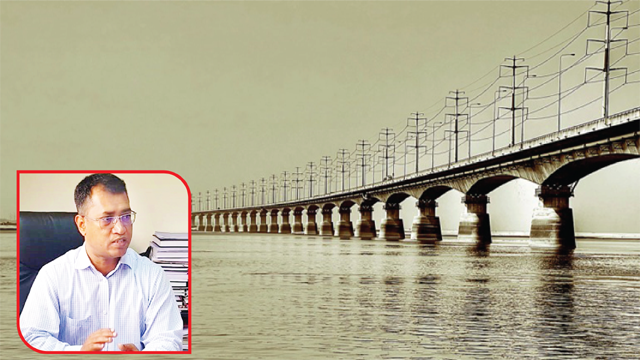
Al Fattah Md. Masudur Rahman in a private conversation
The opening of the Yamuna Railway Bridge will open new doors for the domestic economy
Published:
২৩ সেপ্টেম্বর ২০২৪, ১৮:৪২

The country's largest and most modern Yamuna Railway Bridge will be inaugurated next December. The overall management work including the construction of the bridge is nearing completion. Al Fattah Masudur Rahman, the project director of the bridge, said that new opportunities will be opened in the economy of Bangladesh through the inauguration of this bridge. He recently expressed such optimism in a private conversation with the media personnel at the project director's office. He said that Bangladesh's longest and most modern railway bridge will be inaugurated with a positive message regarding environment and communication management. From the moment of the inauguration of this bridge, there will not only be a major change in the communication management in the country, it will start playing a large and positive role in the development of the national economy and in protecting the balance of the environment. From the moment the bridge is inaugurated, the speed of rail connectivity in the country will increase. Along with this, it will start having a massive and positive impact on the environment.
He said that currently, the speed at which the train is running on the Bangabandhu Railway Bridge is 20 km per hour. A train takes at least 45 minutes to cover the distance between the two stations. A train is now passing through the bridge every 45 minutes. At this time, other trains have to be kept waiting at some stage. This increases time and fuel consumption. After the inauguration of the newly constructed bridge, the total distance of both sides including the bridge will be covered in just 5 minutes.
He said that it would be possible to run 88 trains a day from the day of the inauguration of this bridge. It will increase the convenience of passenger and goods transportation by train. Speeding up will save time. Fuel and money will be saved. He said a train will be able to carry 45 containers at the cost we have to spend on carrying one container. It will save the fuel cost of the importer by at least 45 percent. This massive fuel savings isn't just good news for our economy. It will also control our pollution levels. He said a major part of our import trade is done through land sharing with India. This bridge will begin to play a positive role in that massive trade. Bangladesh Railway is transporting only 3 percent of the containers deposited in the ports of our country so far.
He also said that if this bridge is opened, the pressure on road transport to carry goods and passengers will be reduced. Along with that, road accidents will decrease. All in all, this bridge will be good news for Bangladesh. He said that the Bangabandhu Sheikh Mujib Railway Bridge is fully visible on the river bank. All the spans of the bridge under construction have been installed. Alignment and leveling is also nearing completion. Various drain works and culverts have been completed. The work of station building on both sides, platform installation work, and track work have also been completed.
The bridge is being built with the joint funding of Japan and Bangladesh government. Its construction cost is 16 thousand 780 crores. The foundation stone for the construction of the bridge was laid on 29 November 2020. Piling work for the construction of pillars of this parallel dual gauge double-track railway bridge started in March 2021. Five Japanese contractors are implementing the project in two packages, WD-1 and WD-2. The WD-1 package is being implemented by Japanese international contracting firm OBAI, TOA Corporation, and JEC (OTJ) joint venture.
The WD-2 package is being implemented by Japan's IHI and SMCC joint venture. Apart from this, the work of another package called WD-3 for setting up a signaling system at two stations on both ends of the bridge is also at the final stage. Workers from Japan, Vietnam, Nepal, Australia, the Philippines, and Bangladesh are engaged in the construction of the bridge.
The construction of the parallel dual gauge double-track bridge is nearing completion. Over the bridge at a speed of 120 kilometers per hour broad gauge and 100 km, m. Meter gauge trains can run at speed. It is known that only after Bangabandhu Bridge was opened in 1998, the North-Western rail link was established with Dhaka. However, in 2008, due to cracks in the bridge, the speed limit of the train was reduced. Currently, trains run at a speed of 20 km per hour through this bridge. When the construction of the bridge is completed, it will open a new horizon in the railway connection of North-Western region with Dhaka. The current irony in the railway connection between Rajshahi, Rangpur and Khulna regions with Dhaka will no longer exist. At least 88 passenger and freight trains will run through the bridge every day after the completion of construction. The cost of transportation will also decrease. Along with this, the pressure on the highway will also reduce a lot.



Comment: